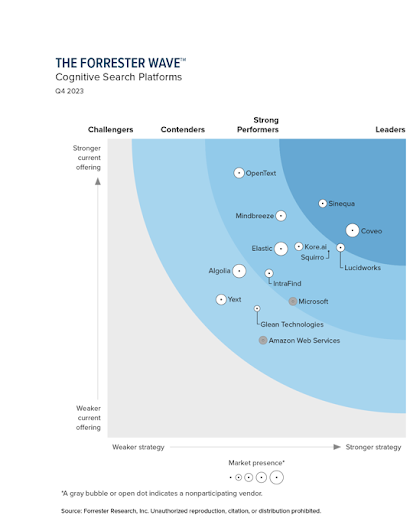While researching more on the GenAI for business Enterprise platforms, I came across the below link which highlights the Forrester Wave™ evaluation of cognitive search platforms (Algolia, Amazon Web Services, Coveo, Elastic, Glean Technologies, IntraFind, Kore.ai, Lucidworks, Microsoft, Mindbreeze, OpenText, Sinequa, Squirro and Yext).
It assesses leading providers based on 27 criteria, analyzing their strengths, weaknesses, and strategic direction.
The cognitive search market is undergoing a transformation driven by generative AI, with increasing demand for search-driven applications and the adoption of technologies like large language models (LLMs) and vector databases.
Vendors are evolving beyond basic search functionalities to offer robust indexing, intent-based search, and extensive data connectivity. The report highlights their capabilities in intent understanding, data integration, and advanced retrieval methods.
Leaders excel in intent-based search and LLM integrations, while other vendors focus on specific industry needs or customization capabilities.
As new players enter the market, buyers must prioritize platforms that offer comprehensive indexing, deep intent analysis, and strong data pipelines.
The report provides a comparative analysis, encouraging buyers to customize evaluations based on their requirements using Forrester’s detailed scorecard.
USPs of few leading Congnitive Search Engine Providers.
- Coveo is a good choice for firms that want powerful automated relevancy tuning
- Sinequa is a good fit for large enterprises that have a variety of different data types, especially specific data demands such as pharma and manufacturing, and that want to deliver a highly contextual search experience that brings those data types together in multimodal results.
- Lucidworks is a good choice for large enterprises who want to build a highly customizable search solution that can support robust internal- and external-facing search experiences.
- Squirro is a good fit for companies who want to build a powerful and flexible search experience for core use cases with focused data sets.
- Opentext IDOL is a good fit for customers who want one of the most extensive search toolboxes, but must be prepared to have some good builders on hand to achieve success with this complexity.
- Kore.ai is a good fit for companies who want to build cognitive search solutions for knowledge workers or for scenarios where direct answers are needed.
- Elastic is a good fit for companies who want to build a hybrid search experience on a flexible foundation, either using their own internal resources or working with a partner to customize the platform to their business needs.
- Glean is a good fit for customers looking for a search capability that can be quickly deployed in their search applications and want to elevate virtual assistants to the same level as the rest of enterprise search.



